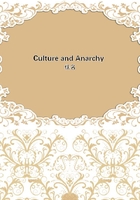
第38章
Our guides and governors who have to be elected by the influence of the Barbarians, and who depend on their favour, sing the praises of the Barbarians, and say all the smooth things that can be said of them. With Mr. Tennyson, they celebrate 'the great broad-shouldered genial Englishman,' with his 'sense of duty,' his 'reverence for the laws,' and his 'patient force,' who saves us from the 'revolts, republics, revolutions, most no graver than a schoolboy's barring out,' which upset other and less broad-shouldered nations. Our guides who are chosen by the Philistines and who have to look to their favour, tell the Philistines how 'all the world knows that the great middle class of this country supplies the mind, the will, and the power requisite for all the great and good things that have to be done,' and congratulate them on their 'earnest good sense, which penetrates through sophisms, ignores commonplaces, and gives to conventional illusions their true value.' Our guides who look to the favour of the Populace, tell them that 'theirs are the brightest powers of sympathy, and the readiest powers of action.'
20 Harsh things are said too, no doubt, against all the great classes of the community; but these things so evidently come from a hostile class, and are so manifestly dictated by the passions and prepossessions of a hostile class, and not by right reason, that they make no serious impression on those at whom they are launched, but slide easily off their minds. For instance, when the Reform League orators inveigh against our cruel and bloated aristocracy, these invectives so evidently show the passions and point of view of the Populace, that they do not sink into the minds of those at whom they are addressed, or awaken any thought or self-examination in them. Again, when our aristocratical baronet describes the Philistines and the Populace as influenced with a kind of hideous mania for emasculating the aristocracy, that reproach so clearly comes from the wrath and excited imagination of the Barbarians, that it does not much set the Philistines and the Populace thinking. Or when Mr. Lowe calls the Populace drunken and venal, he so evidently calls them this in an agony of apprehension for his Philistine or middle-class Parliament, which has done so many great and heroic works, and is now threatened with mixture and debasement, that the Populace do not lay his words seriously to heart.
21 So the voice which makes a permanent impression on each of our classes is the voice of its friends, and this is from the nature of things, as I have said, a comforting voice. The Barbarians remain in the belief that the great broad-shouldered genial Englishman may be well satisfied with himself; the Philistines remain in the belief that the great middle class of this country, with its earnest common-sense penetrating through sophisms and ignoring commonplaces, may be well satisfied with itself; the Populace, that the working man with his bright powers of sympathy and ready powers of action, may be well satisfied with himself. What hope, at this rate, of extinguishing the taste of the bathos implanted by nature itself in the soul of man, or of inculcating the belief that excellence dwells among high and steep rocks, and can only be reached by those who sweat blood to reach her?
22 But it will be said, perhaps, that candidates for political influence and leadership, who thus caress the self-love of those whose suffrages they desire, know quite well that they are not saying the sheer truth as reason sees it, but that they are using a sort of conventional language, or what we call clap-trap, which is essential to the working of representative institutions. And therefore, I suppose, we ought rather to say with Figaro: Qui est-ce qu'on trompe ici? Now, I admit that often, but not always, when our governors say smooth things to the self-love of the class whose political support they want, they know very well that they are overstepping, by a long stride, the bounds of truth and soberness;and while they talk, they in a manner, no doubt, put their tongue in their cheek. Not always; because, when a Barbarian appeals to his own class to make him their representative and give him political power, he, when he pleases their self-love by extolling broad-shouldered genial Englishmen with their sense of duty, reverence for the laws, and patient force, pleases his own self-love and extols himself, and is, therefore, himself ensnared by his own smooth words. And so, too, when a Philistine wants to be sent to Parliament by his brother Philistines, and extols the earnest good sense which characterizes Manchester and supplies the mind, the will, and the power, as the Daily News eloquently says, requisite for all the great and good things that have to be done, he intoxicates and deludes himself as well as his brother Philistines who hear him.